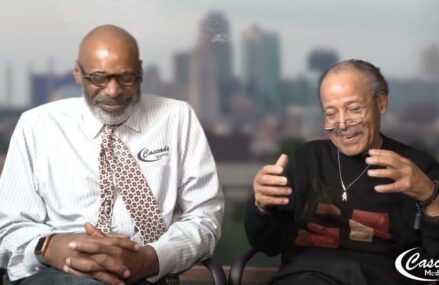By VLADIMIR ISACHENKOV
Former U.S. Ambassadors to Russia James Collins listens while other former Russian and U.S. ambassadors gather together at RIA Novosti in Moscow, Russia, Tuesday, April 2, 2013. Several former ambassadors said Tuesday that the latest cold spell between Russia and the U.S. has been driven by emotions and false perceptions rather than fundamental differences. They called on the Kremlin and the U.S. administration to turn the page on their grievances and focus on tackling global economic and security challenges. (AP Photo/Alexander Zemlianichenko)
MOSCOW (AP) — The U.S. and Russia should overcome their cold spell by focusing on their common economic and security challenges, former diplomats to Moscow and Washington said Tuesday.
The ex-ambassadors, who gathered in Moscow to commemorate the 80th anniversary of the restoration of diplomatic ties, said the strains have been driven by emotions and misperceptions rather than fundamental differences.
They strongly urged the Kremlin and the White House to move past mutual grievances and deal with common threats.
President Barack Obama’s initiative to “reset” relations with Russia has run into obstacles as the Kremlin accuses Washington of meddling in Russia’s domestic affairs. Ties also have been strained by a dispute over U.S. missile defense plans and differences over the Syrian civil war.
U.S.-Russian relations hit a new low in December when Russia banned Americans from adopting Russian children to retaliate against a U.S. law calling for sanctions on Russians who are identified as human-rights violators.
“In many ways, people are passing legislation in both countries that is undermining some of the most important achievements of the last three-four years,” said James Collins, the U.S. ambassador to Russia from 1997 to 2001.
He voiced hope that Moscow and Washington would find a way to approach their differences in a “more reasonable and rational way.”
“We don’t really see a reason, any fundamental reason, why Russia and the United States can’t find common purpose and find means of cooperation to address the real issues that face both of our people,” Collins said.
He added that “neither Russia nor the United States really knows what to do about Syria,” where a civil war has killed an estimated 70,000 people in two years.
Russia has blocked attempts to pass new U.N. sanctions against Syrian President Bashar Assad, but has sought to distance itself from the Syrian ruler and signaled its resignation at the prospect of him losing power.
Vladimir Lukin, the Russian ambassador to Washington in the early 1990s who is now the nation’s rights ombudsman, suggested that Washington was too focused on its own interests to pay attention to the nuances in Moscow’s approach to Syria.
“It’s like an elephant passing by a bear and accidentally stamping on its foot. The bear would feel hurt, but the elephant wouldn’t even notice he did it,” he said.
Lukin recalled a conversation last week with President Vladimir Putin, who asked him about U.S. policy goals in Syria.
“The president asked me… what the Americans want in Syria, saying he couldn’t understand what they want,” he said. “I honestly acknowledged that I can’t make out what they want, but that I know for sure that they want us to join the U.S. in its failure to understand what to do in Syria and to not act independently.”
Moscow has argued that international efforts should focus on encouraging peace talks between Assad and his foes, even though the Syrian opposition has refused such negotiations. The rebels say the Syrian strongman must step down over his violent crackdown on the uprising.
The ambassadors said in their conclusive statement that Moscow and Washington should work together to encourage “negotiations without preconditions or linkage,” to seek an immediate U.N.-monitored humanitarian cease-fire and to encourage protection for all minorities in Syria.
“We both agree that preconditions to negotiation aren’t the way to start talks,” Thomas Pickering, the U.S. ambassador to Moscow in 1993-1996, said during a discussion at the Moscow office of the Carnegie Endowment.
Pickering also said that Russia and the U.S. are “a little closer together on Iran than many people suspect” and are “providing a serious leadership” in the international negotiations intended to end a standoff over the Iranian nuclear program.
Moscow and Washington also see more common ground than before on the Mideast peace settlement, and their “ideas of what might be the final agreement are very close together,” he added.
The ambassadors said that joint action on common threats should help mend the rift.
“We must try to find a way to keep these basically emotional issues that have been so much in the news recently, keep them in their perspective and concentrate more on those areas where we need to cooperate, we can cooperate and where our countries need that cooperation,” said Jack Matlock, who served as U.S. ambassador to Moscow in the waning years of the Soviet Union.



